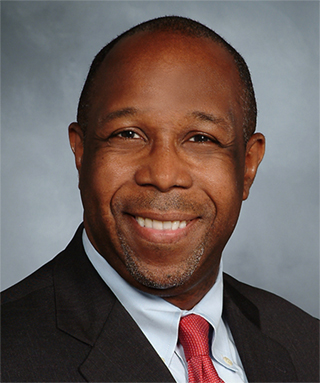8 Facts About Prostate Cancer
Urology experts dispel common myths and misconceptions about prostate cancer and the preventive screenings involved.

Prostate cancer is the most common type of cancer among men in the United States after skin cancer, and about one in eight men will be diagnosed with the disease during his lifetime, according to the American Cancer Society. It is also one of the most treatable types of cancer, with high survival rates. While the screening process is often quick and painless, many are intimidated by the exam and therefore put it off.

Dr. Alfred Winkler
“There are so many men who are afraid of what they think being evaluated for prostate cancer entails that they completely avoid the topic,” says Dr. Alfred Winkler, chief of urology at NewYork-Presbyterian Brooklyn Methodist Hospital and an assistant professor of clinical urology at Weill Cornell Medicine. “Our goal is to offer comprehensive services that can help men get the preventive care and screenings they need so they can stay healthy.”
Health Matters spoke with urology experts at NewYork-Presbyterian to get the facts about prostate cancer, as well as dispel some common misconceptions about prostate cancer screenings.
Fact #1: When getting screened for prostate cancer, a rectal exam is not always necessary.
Dr. Douglas Scherr, chief of the Division of Urologic Oncology at NewYork-Presbyterian/Weill Cornell Medical Center, says that prostate cancer screening does not always mean having a rectal exam. “The starting point to screening is getting a blood test to determine the amount of prostate specific antigen (PSA) in your blood,” he says. “If your PSA is found to be abnormal, the next step is doing an MRI to help determine if there are suspicious areas in the prostate that represent cancer. An MRI is an important tool to determine whether to do a biopsy.”
For patients who are being considered for surgery, a rectal exam may help inform the treatment. “The exam can help doctors know where the abnormal regions within the prostate are,” says Dr. Scherr. “Although a rectal exam has taken a bit of a backseat to an MRI in terms of the screening program, it does help with treatment planning.”

Dr. Douglas Scherr
Fact #2: The earlier you catch prostate cancer, the more treatment options you will have.
Prostate cancer is highly treatable if caught early, which is why screening is so critical. “It is a disease that can be cured if detected early on,” says Dr. Scherr. According to the American Urological Association, those with average risk should start prostate cancer screenings beginning at age 50. But individuals should really begin talking with their doctor in their 40s to see if they need prostate cancer screening earlier than age 50 based on their risk level.
“The earlier a patient deals with this issue, the more choices they have. The longer a person waits and the more they delay, the narrower those choices become,” says Dr. Winkler.
Treatment can vary depending on the stage of diagnosis. “Factors like how severe the cancer is, a patient’s age, or other medical comorbidities that they may have are considered,” says Dr. Scherr. “The patient and physician then participate in shared decision making in terms of deciding on treatment, which may at times involve more than one if it is an aggressive prostate cancer.”
Prostate Cancer Treatments
Active surveillance: Not every patient receives immediate treatment after a prostate cancer diagnosis. “About 25% of patients, specifically those with low- or intermediate-risk prostate cancer, are put on active surveillance instead of other more aggressive treatments,” says Dr. Scherr. “We monitor patients closely and every six months, we conduct PSA blood tests and rectal exams. And then once a year, we do an MRI on them. Occasionally, we will do confirmatory biopsies on these patients.”
Surgery: “With surgery, which is called a radical prostatectomy, we remove the entirety of the prostate and surrounding lymph nodes. It is a laparoscopic surgery, done robotically,” says Dr. Scherr. “Patients typically either go home on the same day or stay in the hospital for one night. The risks of surgery have to do with urinary control, sexual dysfunction, and urinary tract infection, although we take great precautions to avoid that.”
Radiation therapy and hormone therapy: The standard of care now for radiation therapy is stereotactic radiation therapy, which is a five-day course of radiation therapy. “It is a brief treatment for around 20 to 30 minutes each day,” says Dr. Scherr. Radiation therapy is sometimes combined with hormone treatments or medications that lower a man’s testosterone. “In intermediate and high-risk diseases, there is evidence to suggest that hormone therapy enhances the effects of radiation in those individuals, or sometimes men who have a large prostate. We may give them hormone treatments to shrink it down in anticipation of the radiation therapy,” he says.
Chemotherapy: For patients with advanced disease, such as if the cancer has spread outside of the prostate, chemotherapy may be recommended. “It can be used with hormone therapy,” says Dr. Scherr.
Fact #3: An abnormal PSA test does not always indicate prostate cancer.
While helpful in early prevention, a PSA test — a blood test that is used to screen for prostate cancer — is not always 100% accurate. A PSA test can be abnormal for many reasons other than prostate cancer. One reason could be an enlarged prostate, a noncancerous, common condition that impacts men as they get older. “PSA tests are just one piece of the overall screening puzzle, and discussing this test with a urologist can be helpful,” says Dr. Meenakshi Davuluri, an attending urologist at NewYork-Presbyterian Brooklyn Methodist Hospital and an assistant professor of clinical urology at Weill Cornell Medicine.
Fact #4: Black men have a higher risk of prostate cancer.
Studies show that one in seven Black men will develop prostate cancer in their lifetime. “African American men are two times more likely to be diagnosed with prostate cancer and are more likely to be diagnosed with a more aggressive form of cancer,” says Dr. Davuluri. “So screening for those high-risk populations is very important.”

Dr. Meenakshi Davuluri
Fact #5: Family history increases risk.
If your father, your brother, or another close relative has had prostate cancer, be sure to tell your doctor. They may want you to be screened earlier since a family history increases the potential risk of prostate cancer. The bottom line: If you are in a high-risk group, speak to your doctor about the risks and benefits of yearly rectal exams and PSA tests.
Fact #6: You may be asymptomatic and still have prostate cancer.
Unless cancer has spread outside of the prostate, about 95% of cases have no symptoms, says Dr. Scherr. “In cases that are detected early, it is typically because a person’s PSA was elevated, so screening is incredibly important,” he says.
Fact #7: As you get older, your risk of prostate cancer increases.
After you turn 65 years old, your risk of prostate cancer increases exponentially. About six in 10 men who are diagnosed with prostate cancer are over 65.
Fact #8: Overall physical health and lifestyle play a role.
According to Dr. Winkler, healthy lifestyle changes can make a difference in reducing the risk for prostate cancer. His recommendations:
- Maintain a healthy weight.
- Eat less red meat and more green, leafy vegetables.
- Exercise regularly.
- Don’t smoke.
- Manage stress.
“Following healthy dietary guidelines, making simple lifestyle changes, and getting recommended screenings can all reduce the risk of prostate cancer, but men in high-risk groups should be under a physician’s care,” says Dr. Winkler.
Additional Resources
Protect yourself by getting screened for prostate cancer. Learn more about prostate cancer treatment at NewYork-Presbyterian Brooklyn Methodist Hospital and make an appointment with a urologist.
Alfred Winkler, M.D., MBA, is chief of urology at NewYork-Presbyterian Brooklyn Methodist Hospital. He is also an assistant professor of clinical urology at Weill Cornell Medicine. Dr. Winkler believes that patient education is essential to the collaborative effort between physician and patient to achieve an optimal outcome. In his practice, he spends the extra time to make certain his patients have a thorough understanding of both their illness and the treatment options available. Dr. Winkler’s particular areas of focus are men’s health, stone disease, and voiding dysfunction in both men and women.
Douglas Scherr, M.D., is the chief of the Division of Urologic Oncology at NewYork-Presbyterian/Weill Cornell Medical Center and a professor of urology at Weill Medical College of Cornell University in New York City. Dr. Scherr’s clinical focus is on the treatment of urologic malignancies. In particular, the treatment of prostate cancer, bladder cancer, kidney cancer, and testicular cancers, as well as genitourinary and retroperitoneal sarcomas. Dr. Scherr was the first physician at Cornell to perform a robotic prostatectomy, and he has since performed hundreds of these procedures and travels nationally and internationally teaching the procedure to many urologic surgeons. Dr. Scherr has expanded his robotic practice in Manhattan to now include robotic-assisted removal of bladders with total bladder reconstructions.
Meenakshi Davuluri, M.D., M.P.H., is an attending urologist at NewYork-Presbyterian Brooklyn Methodist Hospital and an assistant professor of clinical urology at Weill Cornell Medicine. She has published numerous papers within urology as well as authored chapters for urologic textbooks. She also has served as a reviewer for major urologic journals. She is passionate about disparities in healthcare and is a fellow with the Department of Population Health Sciences at Weill Cornell Medicine.Dr. Davuluri’s current research focuses on outcomes associated with prostate cancer treatment and improving the quality of life in prostate cancer survivors. She is an active member of the AUA, New York Section of the AUA, and the American Medical Association.

